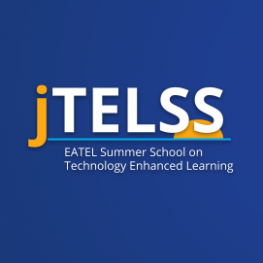Speakers
Maria Perifanou
University of Macedonia, GreeceKaterina Tzafilkou
University of Macedonia, GreeceStart
24/05/2022 - 16:00
End
24/05/2022 - 17:30
Applying Learning Theories in LMS environments
Tuesday 24/05 16:00-17:30h
Outdoor Area A
Abstract.
Despite the extended research done on evaluating the quality of e-learning platforms and Learning Management Systems (LMS), usually previous research focuses on exploring and evaluating mostly the platforms’ technical aspects and much less their pedagogical potentials. This workshop introduces the basic learning theories and discusses how they can affect eLearning in the context of Online Education. The workshop also explores via hands-on collaborative activities how applying Learning Theories in LMS environments can be highly beneficial in promoting successful and innovative elearning practices.
The participants will be invited to form teams and to collaborate together in exploring well known LMS platforms (i.e., Moodle, Google classroom, Edmodo) and in identifying basic technical features that could be linked to specific learning theories, in order to facilitate the development of specific learning skills. Then, they will be invited to create and present their own set of learning activities for LMS that they will develop for a specific target group of students in a simulated teaching scenario.
Needs Analysis
Understanding how to exploit specific technical features of an LMS platform in order to apply concrete learning theories and to promote the development or practice of specific learning skills is highly important for PhD students who do research in the field of Technology Enhanced Learning.
PhD students will be able to understand better how learning theories, media types and technologies are interconnected and evolve together bringing individuals from traditional teacher-centered learning toward community and participatory learning and from content driven learning toward process-driven and innovative approaches.
Learning Objectives
The participants will:
- Learn what learning theories are and understand their basic characteristics;
- Explore which are the learning theories for Online Education;
- Discuss about well- known LMS and share experiences regarding their use;
- Employ hands-on, group-based, collaborative activities on matching technical features and learning media to learning theories;
- Design and present their own online learning activities in which they use a variety of technical LMS features in order to promote a blend of different learning theories;
- Learn to work in collaboration.
Pre-activities
No specific activities are necessary.
Session Description
10 mins: Break the ice and get to know each other. Brief description of the workshop’s main activity, i.e. what are the objectives and main outcomes.
5 mins: #1st short online hands on activity. Match each learning theory to its description.
10 mins: Brief presentation & discussion of the basic learning theories and well–known LMS for Online Education, sharing of LMS experiences between participants.
5 mins: Team forming. Participants will be called to form at least two teams.
35 mins: #2nd hands on activity. Each team will be invited to search on the web and create a list of specific features of a well known LMS that they use. Then the other team will have to:
- a) add which learning theories can be promoted via these technical features,
- b) design and propose their own online activities for a specific target group of students for the selected LMS, and a teaching scenario.
20 mins: Group presentations Participants will present the outcomes of their group work. A discussion will take place amongst the participating team members.
10 mins: Final Discussion & Wrap up the session.
Please allow for some variation on the exact session step timing and application.
Post – Activities
There will be a feedback evaluation questionnaire, to help us understand the impact value that the workshop had to the participants.
Literature recommendations:
Anderson, Terry & Elloumi, Faithi. (2004). Theory and Practice of Online Learning. Available at: http://lst-iiep.iiep-unesco.org/cgi-bin/wwwi32.exe/[in=epidoc1.in]/?t2000=020568/(100).
Mohammed, Ouadoud & Chkouri, Mohamed & Nejjari, Amel. (2018). Learning Management System and the Underlying Learning Theories: Towards a new Modeling of an LMS. International Journal of Information Technology. 2. 25–33. Available at: https://www.innove.org/ijist/index.php/ijist/article/viewFile/24/17
Picciano, Anthony G. (2017). Theories and Frameworks for Online Education: Seeking an Integrated Model. Online Learning, [S.l.], v. 21, n. 3, sep. 2017. ISSN 2472-5730. doi:http://dx.doi.org/10.24059/olj.v21i3.1225.
Thomas, H. (2020, October 1). What are learning theories and why they are important for learning design. myBRAINisOPEN. Available at: https://www.mybrainisopen.net/learning-theories-and-learning-design/.


